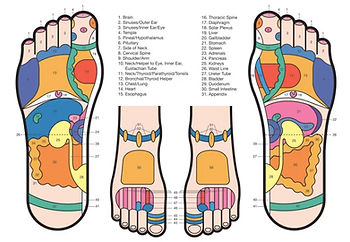Reflexology is a powerful and impactful complimentary practice for women in all stages of pregnancy. If you are unfamiliar with reflexology here’s a little about what it is and how it can help promote a happy and healthy pregnancy.

WHAT IS REFLEXOLOGY. Reflexology is a non-invasive technique that helps support the body's natural healing process. A reflexologist uses manual techniques on specific points on the hands, feet, and ears to aid in the reduction of tension and stress, promote relaxation, support the detoxification process and help improve circulation. According to the national board, “these techniques stimulate the complex neural pathways linking body systems, supporting the body’s efforts to function optimally.”
WHY IS REFLEXOLOGY EFFECTIVE. Reflexology returns the body to a state of balance so that our internal body systems can heal themselves. In so doing, we create an environment where a healthy baby can thrive. In my work I have seen women who were given the “infertility sentence” get pregnant within a couple months of receiving reflexology sessions regularly. We are seeing more and more cases of women who were told they wouldn’t be able to have a child to women having healthy pregnancies and more easeful experiences after childbirth.
CONCEPTION AND STRESS. Having practices in San Francisco and New York I find it quite common that many women have difficulty conceiving. We live in a time where women are working more and the level of stress is high. Infertility has various causes. For women, it can be related to hormonal imbalances, cysts, fibroids, or adhesions in the uterus or fallopian tubes, thyroid gland issues or stress. For men, it is often due to insufficient number of sperm, inability to ejaculate, internal reproductive issues, or stress. The common denominator, stress! Stress throws our bodies out of balance and into abnormal states of fight of flight. Stress also can lead to dis-ease within the body. Over production of cortisol during the conception stage can lessen ones ability to conceive. According to the National Center for Biotechnology Information (NCBI), the US National Library of Medicine (NLM), and the National Institutes of Health (NIH), high levels of cortisol during pregnancy can also have adverse affects on a child.
(https://www.ncbi.nlm.nih.gov/pmc/articles/PMC2786250/).
While it sometimes feels difficult to “control” our stress, there are many options to help us cope with it. The irony too is we don’t have to do anything - our endocrine system is our hormonal messaging control center and if we can bring it back to homeostasis then it can do its job of regulating our hormones and keeping us healthy.
In a reflexology session we address the whole person. While there are points to focus on in the various stages of a woman’s pregnancy, all women are different so the whole person has to be taken into account. We address not only the stress and anxiety associated with getting pregnant, being pregnant, and giving birth; we also address the endocrine and reproductive system imbalances mentioned above. Because reflexology is able to safely address internal structures through the reflexology points located in the feet, hands, and ears, we can bring greater circulation to these areas.
IS REFLEXOLOGY RIGHT FOR YOU. Reflexology is safe and effective for women during pregnancy. It can provide relief for common ailments associated with pregnancy, including morning sickness, nausea, acid reflux and other digestive disorders, constipation, back pain, stress, fatigue, disturbed sleep and insomnia. If you have any concerns ask your doctor.
In looking for a reflexologist, always make certain they are nationally or internationally certified. While there are many places advertising “reflexology”, having a certified reflexologist will insure you get someone who specifically knows how, where, and what points to address.
Chantel is a nationally certified reflexologist with over 10 years experience in the field. She is a practitioner and educator who travels near and far to teach people how to use reflexology for home care. She works regularly in San Francisco, Santa Rosa, New York, and Seattle. She is the Liaison Director for RAC, The Reflexology Association of California.
Reflexology is a complementary practice and is not a replacement for medical care. Reflexology does not claim to cure, diagnose or prescribe and is not a substitute for medical care. If you have concerns about your health, seek advice from your doctor or health care provider.
Tags:
